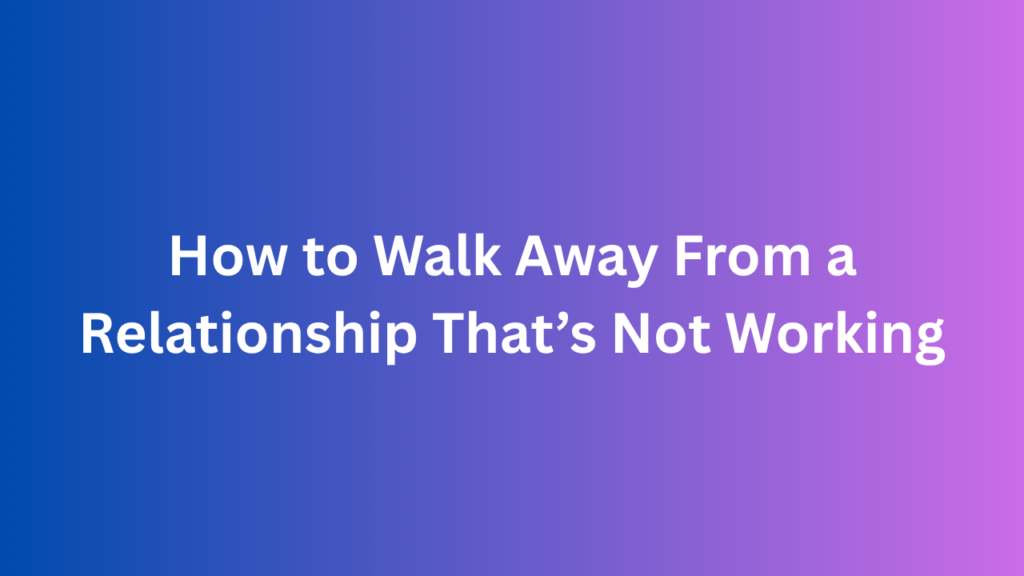Letting go of a relationship is one of the hardest things you’ll ever have to do — especially when you’ve invested time, energy, memories, and love into it. But staying in a relationship that’s not working can slowly erode your self-worth, your peace, and your future happiness.
If you’ve been feeling stuck, confused, or emotionally drained, this guide is for you. Here’s how to recognize when it’s time to walk away — and how to do it with strength, clarity, and compassion.
1. Acknowledge That Something Is Broken
The first step is the hardest: admitting to yourself that things aren’t working.
You might have been hoping things would improve, giving second (or tenth) chances, or clinging to the good moments from the past. But if you’re constantly feeling:
- Unhappy
- Unsupported
- Disrespected
- Drained
…it’s a sign that the relationship is no longer serving your growth or well-being.
Ask yourself honestly:
- Am I staying out of love or out of fear?
- Do I still see a future here that makes me feel excited and secure?
- Am I the best version of myself in this relationship?
2. Understand That Love Alone Isn’t Always Enough
This is a painful truth: you can love someone and still need to let them go.
A healthy relationship also needs trust, respect, compatibility, communication, and shared goals. If those things are missing — no matter how strong the feelings — it may not be sustainable.
You deserve more than just love. You deserve peace, stability, and mutual effort.
3. Don’t Wait for the “Perfect” Time
There will never be a flawless moment to end a relationship. You might be worried about hurting them, dealing with logistics, or the fear of being alone.
But staying for those reasons only delays the inevitable — and often makes the exit even harder later.
If you’ve tried communicating, compromising, and rebuilding — and nothing has truly changed — it’s time to stop hoping for a different outcome.
“You can miss someone and still know they’re not right for you.”
4. Prepare Yourself Emotionally
Walking away isn’t just about leaving physically — it’s about separating emotionally. That takes courage, support, and self-reflection.
Here are a few ways to prepare:
- Journal your thoughts and feelings.
- Talk to a trusted friend or therapist.
- Remind yourself of your reasons for walking away — write them down if needed.
- Understand that grief is a normal part of the process.
You don’t have to be 100% “ready” — you just need to be willing to take the first step.
5. Have the Conversation (With Kindness but Clarity)
When the time comes, have a direct and honest conversation. Don’t ghost, avoid, or drag it out unnecessarily. Be kind — but don’t sugarcoat the truth either.
You can say things like:
- “This relationship no longer feels healthy for me.”
- “We’ve grown apart, and I don’t think we’re able to meet each other’s needs anymore.”
- “I care about you, but I know staying isn’t fair to either of us.”
Avoid blame. Focus on your feelings and needs, not a list of their faults.
6. Set Boundaries After the Breakup
One of the most common traps is going back out of loneliness, guilt, or emotional confusion. If you’ve walked away, protect your space.
That might mean:
- No contact for a while
- Muting or unfollowing them on social media
- Removing reminders from your daily environment
- Clearly stating what level of interaction (if any) is okay
Healing begins when you stop reopening the wound.
7. Reconnect With Yourself
One of the biggest gifts of walking away is the chance to return to you. After a breakup, it’s common to feel lost — especially if the relationship became your identity.
This is your time to:
- Rediscover what makes you happy
- Reconnect with friends, hobbies, and passions
- Set new goals for your personal and emotional growth
- Reflect on the lessons you’ve learned
You didn’t lose — you evolved.
8. Accept That Healing Takes Time
You might feel regret, anger, sadness, or even temporary relief. These are all part of the process. There’s no fixed timeline for healing, so be patient with yourself.
Some days you’ll feel strong. Other days you might miss them terribly.
But slowly — if you give yourself grace and stay committed to your peace — you’ll feel lighter. Clearer. More whole.
And one day, you’ll look back and thank yourself for having the courage to choose you.
Final Thoughts: Walking Away Is Not Weakness — It’s Wisdom
Ending a relationship that’s not working isn’t giving up — it’s growing up. It’s choosing long-term happiness over short-term comfort. It’s choosing truth over denial.
You deserve a relationship that makes you feel safe, valued, loved, and seen. If that’s not what you have, it’s okay to let go — and walk bravely into a future that’s better for your soul.
You are not alone.
Have you ever had to walk away from someone you loved? How did you find the strength to do it? Share your experience in the comments — someone else might need to hear your story today.



